Education
Columbia protesters are a no-show after plans for new encampments were revealed
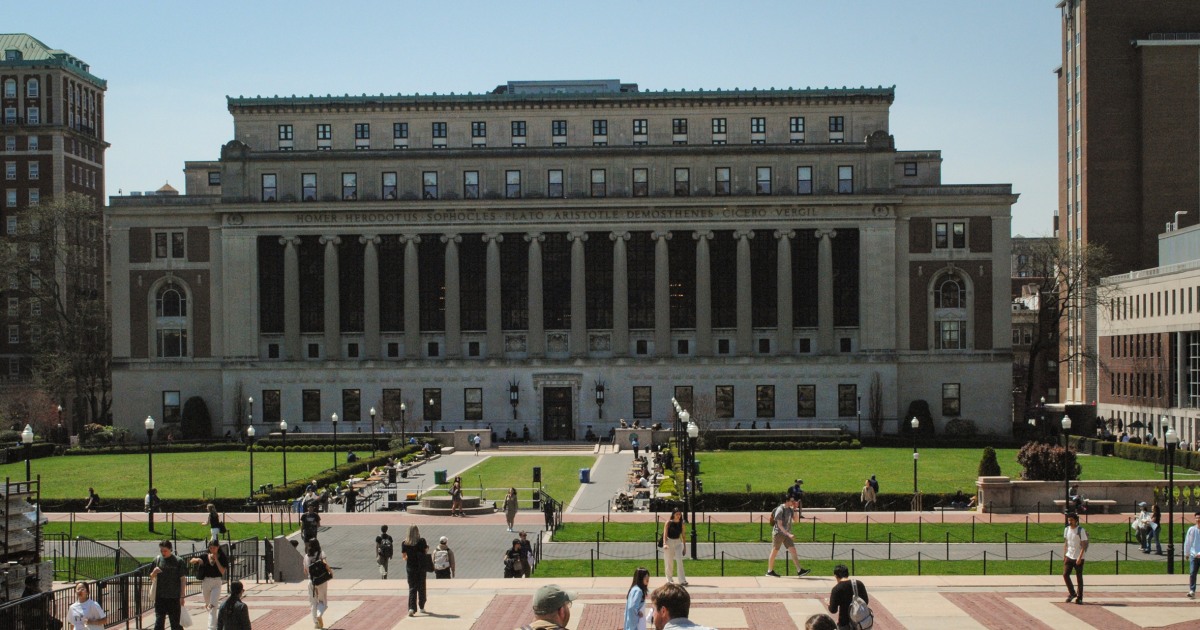
Protesters did not set up new tent encampments or demonstrate against the war in Gaza at Columbia University on Thursday as planned.
NBC News reported Wednesday that a group planned to set up tent encampments on the New York City school’s main campus Thursday afternoon.
The encampments would have been likely to inflame tension at the Ivy League school, which for weeks has been at the center of a tug-of-war between the federal government and its students.
They would have been the first tent cities at the university since students took over a building last year and since the Trump administration embraced an aggressive approach to target what it describes as a failure to deal with antisemitism on college campuses.
More than 100 protesters met Tuesday at a community center in Brooklyn’s Bushwick neighborhood to coordinate tent encampments at Columbia for this week. Organizers, whose identities remain unknown, went to extreme lengths to conceal their plans.
NBC News obtained a recording of the meeting, which revealed that students were planning an encampment Thursday at the university’s main campus in Manhattan’s Morningside Heights neighborhood and a second encampment Friday at the nearby Manhattanville campus.
It is unclear whether the encampment planned for Friday will proceed.
Instead of protests Thursday, the scene on campus included students enjoying one of the first warm days in New York City this spring. Dozens of students lay out beach towels, snapped selfies under the sun and tossed around Frisbees.
There were, however, signs of what the day was expected to bring.
Outside the university gates on 116th Street and Broadway, several New York police officers gathered — but they were gone by 2 p.m., an hour after the protests had been expected to begin.
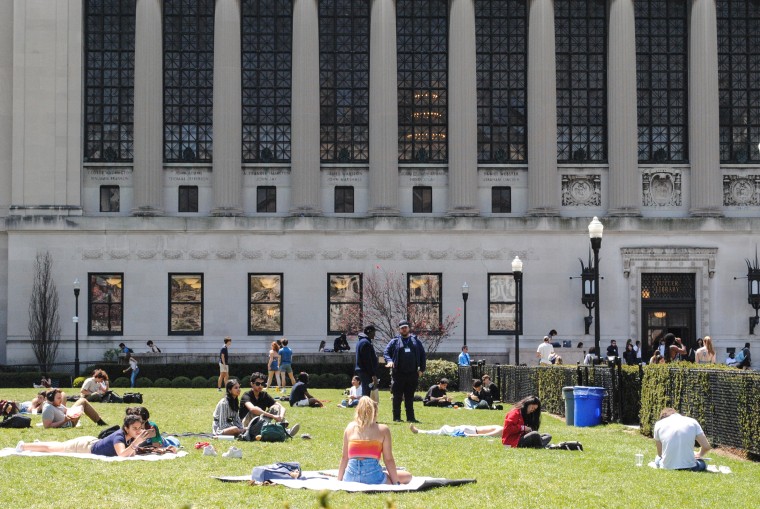
A handful of people who appeared to be security guards in plainclothes circled the planned site of Thursday’s protest before it was expected to begin.
Donovan Cole, 27, a Ph.D. student studying philosophy and education, said the student body’s attitude toward protests seems to have changed since the encampments a year ago. Gone are the days when students felt free to set up tents, take over academic buildings and march for days, as they did last spring, he said.
“There was obviously an antagonistic relationship between the student body and the institution last year. But at the core of that was a kind of faith … that they were both engaging in at least some degree of good faith,” he said. “The student body has sort of felt that’s no longer the case and, rather than producing a sort of stronger outcry of protest, has produced actual legitimate fear in the student body.”
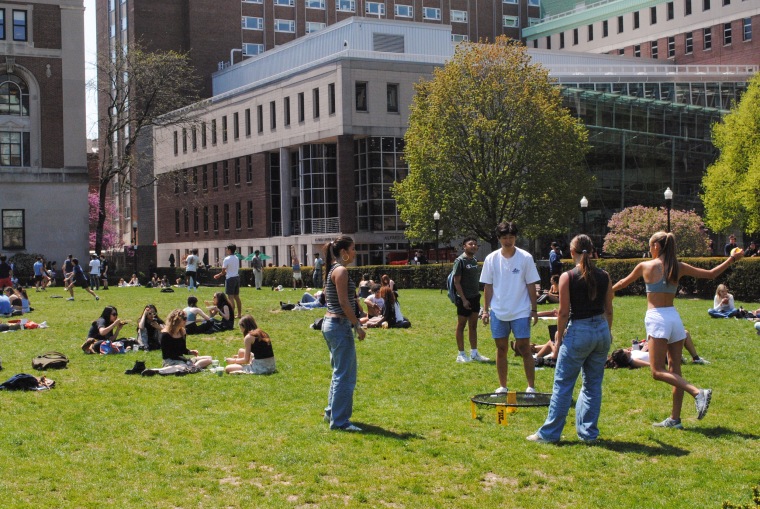
Last month, the Trump administration began terminating federal research grants at several of the country’s most prestigious universities, demanding significant changes to how schools operate. The administration has argued that the universities failed to protect Jewish students amid war protests.
Columbia was the first university the administration targeted. It conceded to a number of the government’s requests, including that it adjust its admissions process, implement “greater institutional neutrality” and hire three dozen new security officers.
The administration similarly challenged Harvard University, which rejected its proposals and sued the federal government.
On Wednesday, President Donald Trump signed a series of executive actions that would enforce stricter oversight of foreign donations to universities and change how they are accredited.
Immigration authorities have apprehended at least three Columbia students in recent weeks. Among them was graduate student Mahmoud Khalil, who helped lead student protests last year.
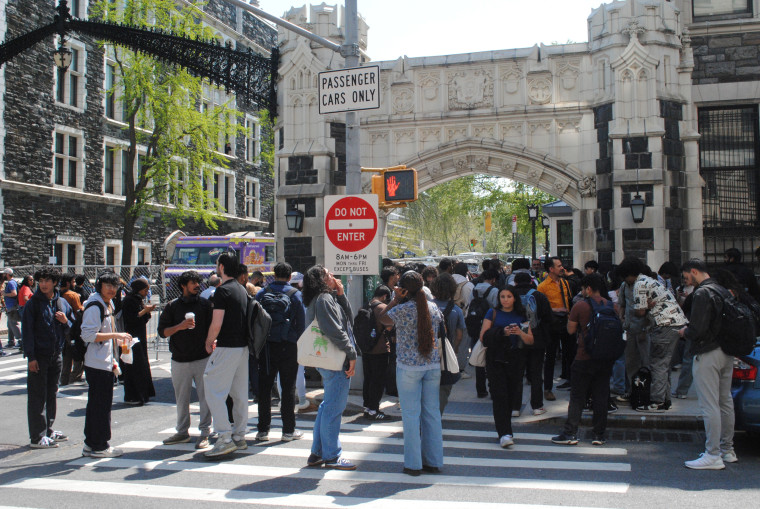
About 45 minutes after the protest at Columbia was expected to start, pro-Palestinian student advocates affiliated with City College of New York announced on social media that they were staging a protest at the nearby public college.
It is unclear whether protesters who had intended to be part of the planned Columbia encampment were among the roughly 50 people who gathered outside CCNY’s gates Thursday afternoon, wearing masks and Palestinian keffiyehs.
However, a student protest group affiliated with Columbia shared the CCNY group’s post on social media.
CCNY closed its gates and appeared to start barring students from entering campus while the protest ensued.
On Tuesday, a crowd of protesters at Yale University set up a handful of tents on campus before they disbanded a few hours later.
Education
Tufts student Rümeysa Öztürk must be moved to Vermont, judge rules
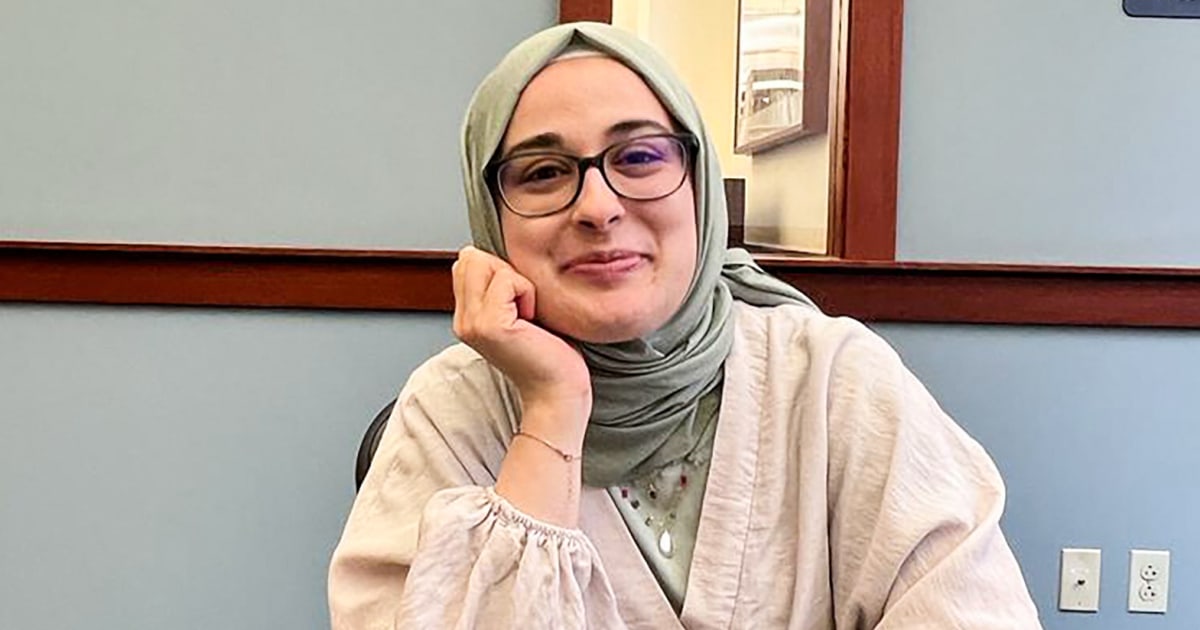
A judge on Thursday denied the government’s request to pause the transfer of Tufts University student Rümeysa Öztürk, who is fighting deportation after writing an essay about Israel and the war in Gaza, back to Vermont.
U.S. District Judge William K. Sessions ruled that the federal government is now obligated to ensure that Ozturk, who is being held in Louisiana, be moved to Vermont by May 1. The decision comes after the Justice Department appealed Sessions’ previous order to transfer Ozturk to Vermont, where her habeas corpus petition challenging her detainment was filed. Federal officials had also asked the judge to pause the order from taking effect while on appeal.
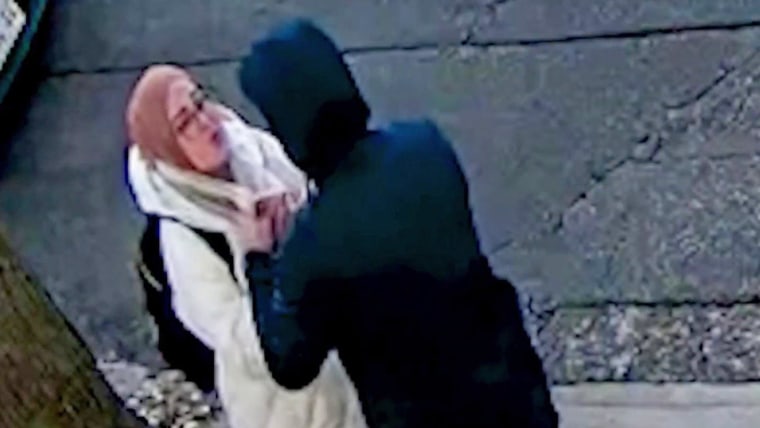
Brett Max Kaufman, senior staff attorney for the American Civil Liberties Union, which represents Ozturk, criticized the government’s attempts to pause the student’s transfer.
“For four weeks, the government has been detaining Ms. Ozturk for writing an op-ed,” Kaufman said in a statement Thursday afternoon order. “And now, it is doing everything within its power to avoid having to justify what it has done, including filing a hail-mary appeal hoping to stop the district court from deciding her claims.”
Neither the DOJ, Department of Homeland Security nor Immigration and Customs Enforcement immediately responded to requests for comment.
In his order, the judge said that any delay of Ozturk’s transfer could prolong “the very detention that is at the heart of this case.”
Last week, Sessions ordered the administration to transfer Öztürk back to Vermont while her habeas petition plays out in federal court. Her deportation case in immigration court in Louisiana would also proceed while she is detained in Vermont.
The government appealed the order days later to the United States Court of Appeals for the Second Circuit, which has yet to weigh in. Soon after, Ozturk’s attorneys opposed the government’s request to pause the judge’s previous order.
“Only one party — Ms. Öztürk — would suffer any harm from a stay, and that harm is irreparable,” Ozturk’s attorneys wrote in court filings. “By contrast, the government suffers no harm at all by holding Ms. Öztürk in detention in Vermont instead of Louisiana and being compelled to justify her continued detention.”
Department of Homeland Security agents grabbed Öztürk, a doctoral student in the United States on a student visa, off a Massachusetts street in late March. DHS accused her of engaging “in activities in support of Hamas.”
Last year, Öztürk co-wrote an op-ed in the Tufts student newspaper that called on the school to “acknowledge the Palestinian genocide” and divest from companies with ties to Israel. The school has said that the essay did not violate its policies.
Öztürk was moved to three locations, including Vermont, before she ended up in Louisiana, despite an order from a district court that said she could not be moved out of Massachusetts without notice.
“For nearly 24 hours, Ms. Öztürk’s attorney was unable to locate her,” the ACLU said in a news release.
Facilities in rural Louisiana have been the subject of human rights criticisms, and immigration advocates say the Trump administration has sent students to a jurisdiction that is more aligned with its immigration goals.
“They’re being placed in facilities that have pretty horrendous conditions, a lot of difficulties with access to counsel and in what is really a more hostile legal jurisdiction to fight their case for the right to remain in the United States,” Mary Yanik, the director of the Immigrant Rights Clinic at Tulane Law School in New Orleans, previously told NBC News.
On Tuesday, a congressional delegation led by Rep. Troy Carter, D-La., visited ICE facilities in Louisiana. The members met with Öztürk and Columbia University student Mahmoud Khalil, a pro-Palestinian activist and green-card holder who was arrested and detained in early March.
“From our communications with these individuals, they’re frightened, they’re concerned. They want to go home,” Carter told reporters after the visit. “They’re happy to see that members of Congress are here to listen, to take good notes, to go back to Washington to ensure that due process is granted, health care is provided and fairness is the rule of day.”
Education
Dartmouth abstains from signing letter against federal funding cuts
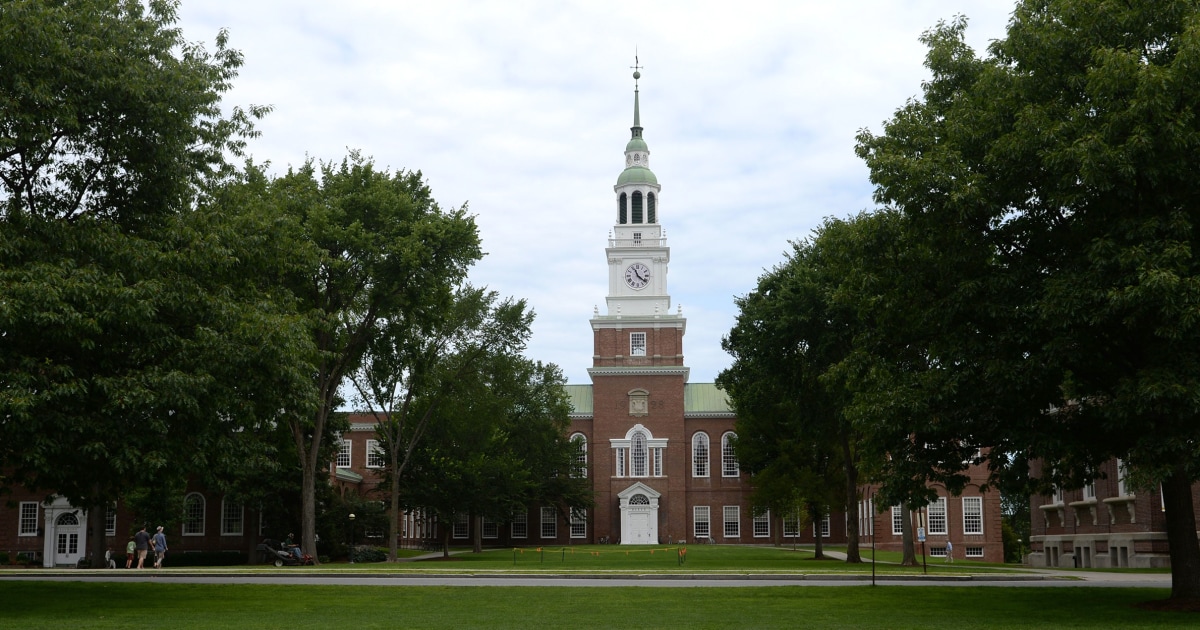
Dartmouth College, the only Ivy League university that did not sign a letter condemning the Trump administration for trying to dictate policies and pausing billions of dollars in federal funding, said doing so would not have been an effective way to defend its mission and values.
College President Sian Leah Beilock instead wants to focus on the lawsuits the university is already involved in that address pauses in funding for the National Institutes of Health and a new Energy Department policy to reduce the funding of indirect costs of research grants to 15%, school officials said Wednesday.
“President Beilock does not believe that signing open form letters like this one is an effective way to defend Dartmouth’s mission and values,” university spokesperson Kathryn Kennedy said in an email.
More than 300 university and college presidents co-signed Tuesday’s letter, which condemns the Trump administration for following through on threats to pause billions of dollars in federal grants and research funding, in part to change schools’ policies and punish them for their handling of student protests.
Cuts targeting Harvard and Columbia came after allegations of antisemitism arose following last year’s student protests against Israel’s military action in the Gaza Strip.
College campuses across the United States erupted in protests a year ago as Israel continued to pound the Gaza Strip to root out Hamas fighters who carried out the Oct. 7, 2023, assault on Israel.
Last month, many Ivy League universities abruptly stopped hiring faculty members, partly prompted by fear of how the Trump administration’s funding cuts could affect them.
The swift and decisive decisions prompted the American Association of Colleges and Universities to write the letter to the Trump administration.
“We will always seek effective and fair financial practices, but we must reject the coercive use of public research funding,” the group wrote. “As leaders of America’s colleges, universities, and scholarly societies, we speak with one voice against the unprecedented government overreach and political interference now endangering American higher education.”
White House spokesperson Harrison Fields said in an email that the administration is “standing up for equality and fairness and will not be swayed by worthless letters by overpaid blowhards.”
Columbia agreed to a list of demands by the Trump administration to start negotiations over restoring $400 million in federal funding that was stripped, but Harvard ultimately rejected a list of demands before it sued the administration this week.
Education
Columbia University students plan to build tent encampments this week, sources say
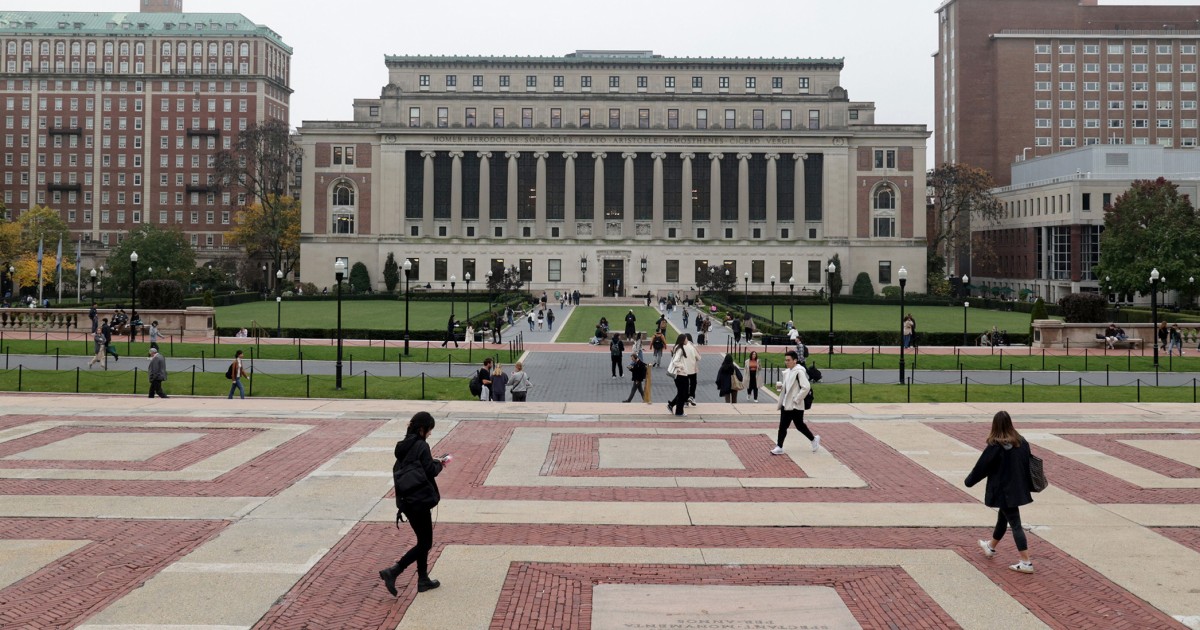
A group of protesters is planning to set up tent encampments on Columbia University campuses this week in protest of the war in Gaza, according to three people familiar with the planning and a recording of a meeting to plan the action shared with NBC News.
The planned encampments come just over a year after students first erected about 50 tents on a university lawn to protest the war and drew the world’s attention.
Those demonstrations, in part, fueled the Trump administration’s effort to extract concessions from Columbia, saying the university failed to quell antisemitism on its campus.
Planning for the encampments has been shrouded in secrecy.
The coordinating meeting took place at a community center on Tuesday night in Brooklyn’s Bushwick neighborhood, approximately 12 miles from campus, according to screenshots of Signal messages from organizers and a person who was at the meeting.
Invitations for the meeting were largely distributed in person or verbally over the phone, according to the person who attended the meeting and asked not to be named due to fears of discipline from the school.
More than 100 people were present at the gathering and all wore masks to conceal their identities, according to the person. It is unclear if all of the participants were Columbia students, the person said.
The student organizers did not introduce speakers by name and instead used Signal usernames and code names — including the beloved Pokémon “Squirtle” and words such as “butterfly” — to distinguish one another, according to the recording.
Organizers have also refrained from referring to the upcoming encampments as “encampments,” according to screenshots of Signal messages from the organizers and conversations with two people familiar with the planning for the protests. In writing, and verbally, participants have designated the encampments with a code name, the “circus.”
Organizers asked demonstrators not to arrive on campus wearing masks on the days of the protests, which they said could alert campus security officers, according to the recording.
“This year feels so much more organized and careful,” the person who was at the meeting said.
Columbia did not immediately return a request for comment.
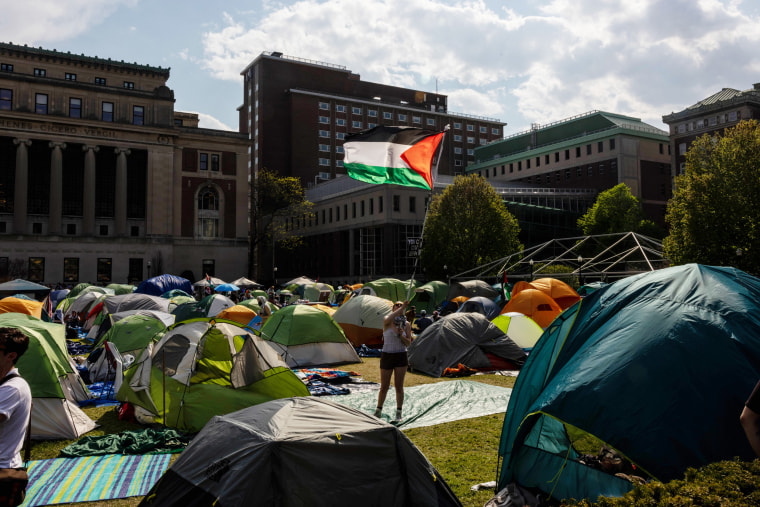
Students are planning to erect an encampment on Thursday at the university’s main campus in Manhattan’s Morningside Heights neighborhood and a second encampment on Friday at the university’s nearby Manhattanville campus, according to the recording.
“When we take over the lawn, our goal is to unify the space and make it our own,” one of the organizers said, according to the recording.
Thursday’s encampment was planned to start at 1 p.m. on the West Butler Lawn of the university’s main campus, where encampments were set up last year, according to the recording, and disperse before nightfall or before police enter the campus.
There will be a second encampment that is expected to be more robust and begin the next day. It is unclear when the Friday encampment will begin, but according to the recording, students plan to stay indefinitely and expect arrests to be made.
Organizers chose to stage Friday’s encampment at the Manhattanville campus — the site of the university’s business school — because it is not gated off to outsiders, unlike the main campus, according to a person who attended the meeting.
A speaker at the meeting also said that the site of the second encampment was aimed at protesting the university’s gentrification of Harlem, according to the recording.
“Any action that we do will bring police, will bring repression and we thought about that deeply and we’re aware of that,” a speaker at the meeting said to applause. “And we’re stuck in this situation where inaction is also violence.”
Organizers of the upcoming protests have distributed several guidelines, obtained by NBC News, to student protesters. These guidelines cover legal risks associated with protesting, best practices for encounters with law enforcement and strategies for securing their digital presence.
The document on digital security advises that students communicate only through encrypted messaging services such as Signal, over the phone, or in person. It also suggests that students turn off Wi-Fi on their phones while protesting to avoid being traced by the university.
Another form shared by the organizers and obtained by NBC News asks students to provide “all the information necessary to support your legal defense” for their emergency contacts in the event of arrest.
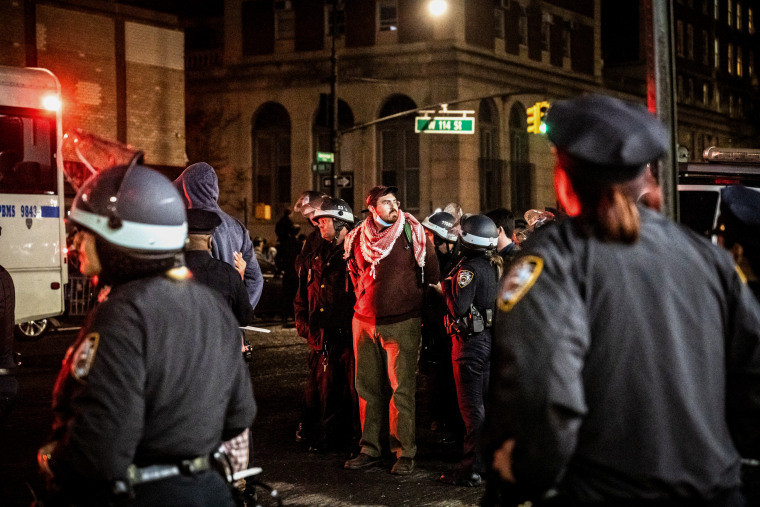
It asks for student protesters to list any medical conditions, insurance information, prescriptions, if they have dependents, where their government IDs are, their address and how emergency contacts can access their apartments or homes.
“Given the Trump Administration’s commitment to pursuing federal action against pro-Palestine protestors and the abduction of our comrade Mahmoud Khalil, we are now asking students to prepare not only for potential arrest and jail for several hours or overnight, but for the possibility of prolonged jail time,” the form reads. “Give serious thought to the question of how you would prepare for weeks or months in jail.”
The upcoming encampments precede a monthslong campaign of protests at the university last year, which inspired similar demonstrations at college campuses across the country and around the world. Dozens of students who participated in the encampments were arrested by local authorities or expelled from the university.
The protests were prompted by the Israeli military’s response to the Oct. 7, 2023, Hamas terrorist attacks, in which more than 1,200 people were killed and about 250 were taken hostage, according to Israel. More than 51,000 people have been killed in Gaza and millions have been displaced in the war that followed, according to health officials in Gaza.
Student activists staged the demonstrations last year in an attempt to get their universities to divest from companies linked to the Israeli government.
The encampments also come amid the Trump administration’s push to intervene in Columbia’s affairs and some of the nation’s oldest higher education institutions. The federal government canceled the university’s federal grants on March 7, part of what the Trump administration says is a broader effort to “root out” antisemitism on college campuses.
In an effort to restore the grants, which fund dozens of universities’ top-tier research expeditions, Columbia agreed to a list of the administration’s demands on March 21.
The demands included instituting a mask ban at protests in most cases; hiring an outsider to oversee its department of Middle East, South Asian and African studies; committing to “greater institutional neutrality”; and enlisting three dozen new security officers with newly installed powers to arrest students.
Faced with its own deal by the Trump administration, Harvard University rejected the administration’s demands and sued the administration several days later, aiming to restore billions in funding.
The protests also come several weeks after federal immigration officials apprehended at least three Columbia students who participated in the student-led protests, including 30-year-old Mahmoud Khalil.
-
Europe2 days ago
How to visit Rome for Pope Francis’ funeral and conclave
-

 Sports2 days ago
Sports2 days agoLA Lakers level first-round series against Minnesota Timberwolves behind big Luka Dončić performance
-

 Education1 day ago
Education1 day agoHarvard’s president says the school will ‘not compromise’ on its rights with the Trump admin
-
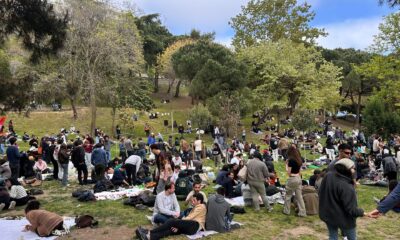
 Middle East2 days ago
Middle East2 days ago‘I grabbed my cat and ran’: Istanbul panics as earthquake hits | Earthquakes News
-
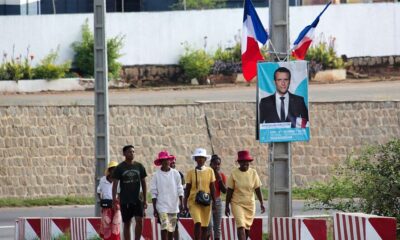
 Africa2 days ago
Africa2 days agoEmmanuel Macron starts two-day visit to Madagascar
-
Africa2 days ago
Italy launches security plan ahead of pope’s funeral
-

 Lifestyle2 days ago
Lifestyle2 days agoNFL draft suits give prospects another way to cash in on their fame, flash their style on red carpet
-

 Conflict Zones2 days ago
Conflict Zones2 days agoWhite and Black farmers still bear the scars of Zimbabwe’s land grabs | Poverty and Development News




